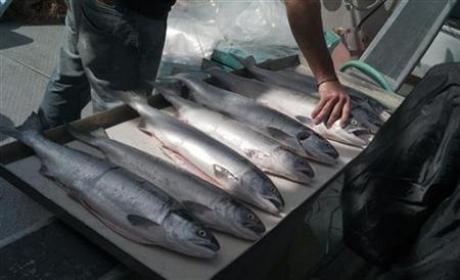World Pays High Price For Overfishing, Studies Say
Date: 15-Sep-10
Country: CANADA
Author: Allan Dowd

A fisher sells salmon from his boat in Steveston, British Columbia
September 1, 2010.
Photo: Andy Clark
Decades of overfishing have deprived the food industry of billions of dollars in revenue and the world of fish that could have helped feed undernourished countries, according to a series of studies released on Tuesday.
The Canadian, U.S. and British researchers behind the studies also said that overfishing is often the result of government subsidies that would have been better spent conserving fish stocks.
Fisheries contribute $225 billion to $240 billion to the world economy annually, but if fishing practices were more sustainable, that amount would be up to $36 billion higher, according to the four papers published in the Journal of Bioeconomics.
The researchers said the data demonstrate that the reasons for protecting world's ocean fish stocks from unsustainable fishing are more than just biological.
"Maintaining healthy fisheries makes good economic sense, while overfishing is clearly bad business," said Rashid Sumaila, an economist at the University of British Columbia in Vancouver, who led the research.
The researchers estimated that from 1950 to 2004, 36 to 53 percent of the fish stocks in more than half the exclusive economic zones in the world's oceans were overfished, with up to 10 million tonnes of fish catch now lost.
They said many governments underestimate the financial impact of overfishing, such as the affect on related industries, and, as a result, they have less incentive to protect fish stocks.
It is the poor in developing nations who are hurt the most by overfishing because they cannot replace through imports the nutrition and revenue that is lost, the researchers said.
Fish that would have been available had it not been for past overfishing could have helped feed nearly 20 million undernourished people a year in poorer counties, the researchers estimated.
The researchers used international data on ocean fish stocks in their studies, and did not include data from aquaculture and fresh water fisheries, although they said they hope to include that information in future studies.
Governments around the world provide up to $27 billion in subsidies annually to the fishing industry, but about 60 percent of that goes to supporting unsustainable fishing practices, the studies said.
"Taxpayer money is directly contributing to the decline of worldwide fish stocks," Sumaila said.
The researchers said counties are also missing economic opportunities by not promoting alternative uses of fisheries, such as whale watching and other marine recreational activities.
(Editing by Peter Galloway)